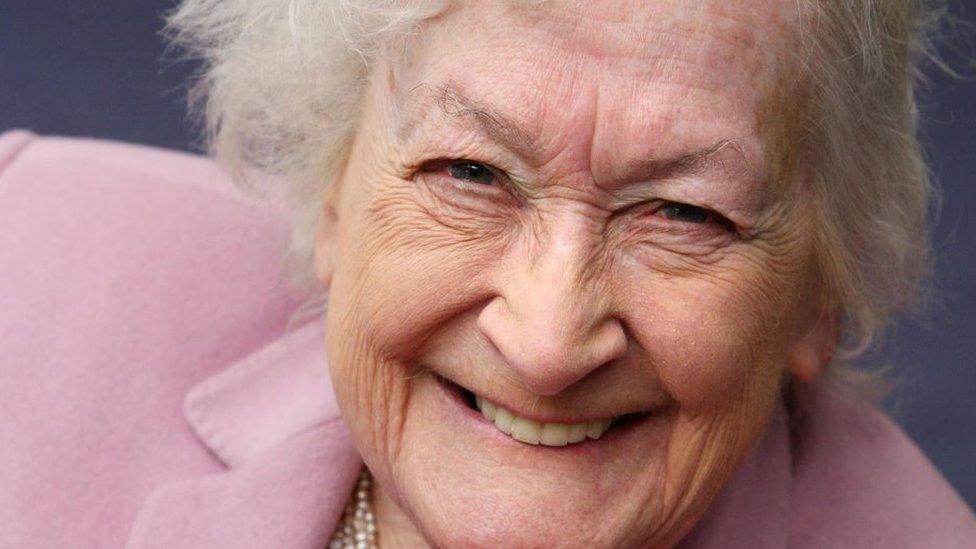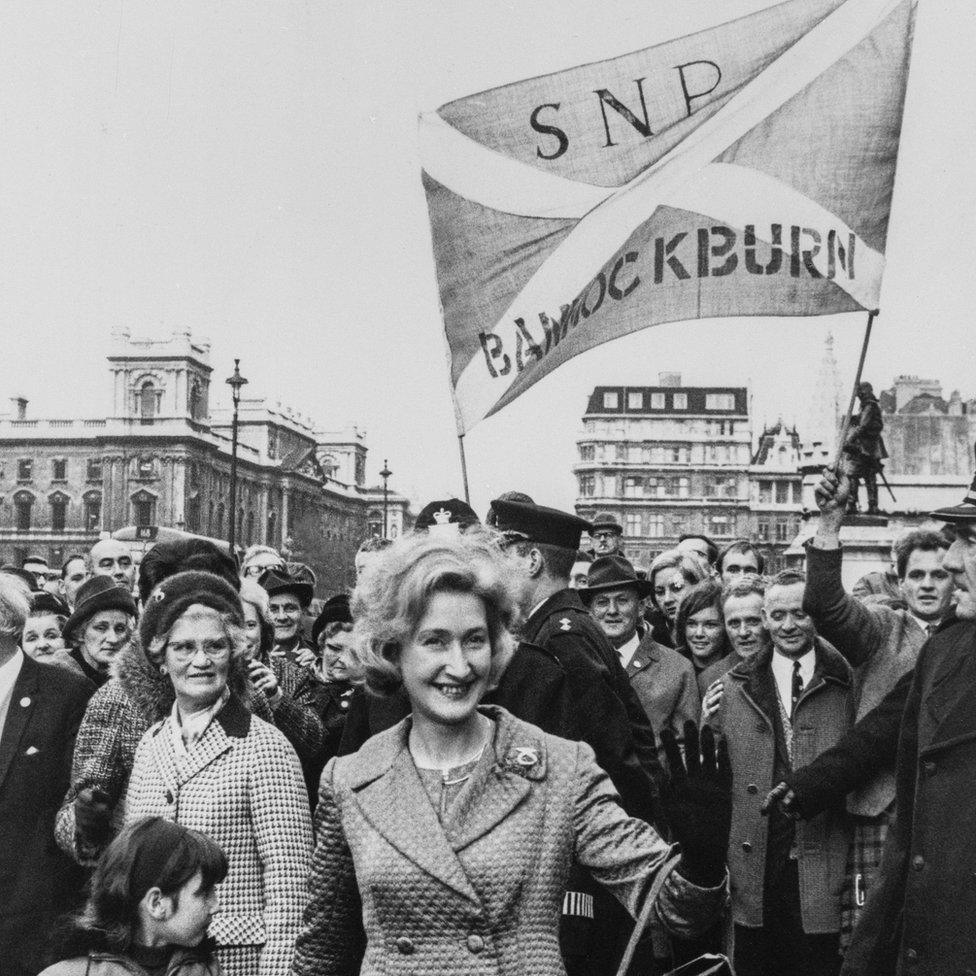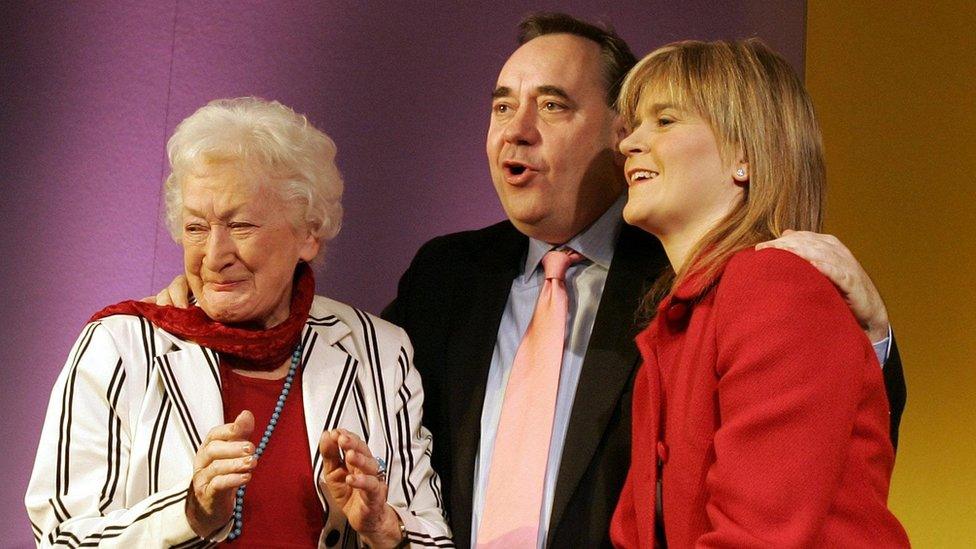SNP political icon Winnie Ewing dies aged 93
- Published

Mrs Ewing became known as Madame Ecosse during her time as a Member of the European Parliament
Former SNP MP Winnie Ewing - an icon of the Scottish independence movement - has died aged 93.
Mrs Ewing was elected to the House of Commons in the 1967 Hamilton by-election and served as president of the party from 1987 to 2005.
Her son Fergus and daughter Annabelle are both MSPs at Holyrood.
Mrs Ewing's election to Westminster in 1967 was a breakthrough which marked the start of the SNP's rise throughout the 1970s.
Mrs Ewing became the SNP's first female MP in 1967
After becoming the SNP's first female MP, she famously told the press: "Stop the World, Scotland wants to get on".
A statement issued on behalf of her family said: "Mrs Ewing, generally considered the most important Scottish politician of her generation, served as an MP, MEP and MSP, and was the first presiding officer of the reconvened Scottish Parliament in 1999.
"She sparked the revival of the SNP's fortunes, which continue to this day, with her victory in the Hamilton by-election of 1967.
"Mrs Ewing died on Wednesday surrounded by her family.
"She is survived by children Fergus, Annabelle and Terry, and grandchildren Natasha, Ciara, Jamie, and Sophie. She also had a deep affection for daughters-in-law Fiona and Jacqui.
"She was a loving and devoted wife to Stewart Martin Ewing, who died in 2003 aged 76.
"It would be appreciated if the family could be accorded privacy at this time."

Winnie Ewing became an MP after winning the 1967 Hamilton by-election
Flags at Holyrood were lowered as a mark of respect following confirmation of Mrs Ewing's death.
Scotland's first minister Humza Yousaf, the SNP's leader, said he was heartbroken at losing "a shining light of our party".
He added: "Without Winnie's trailblazing victory in the 1967 Hamilton by-election and without her dedication to the cause of independence, the SNP would simply not have achieved the success we have.
"Winnie, more than anyone else, ensured our party was outward looking. She promoted Scotland's interests in Europe over many years. Thank you Madame Ecosse for your service to our party and country."
Depth of gratitude
Former first minister Nicola Sturgeon - who described Mrs Ewing as her political hero - tweeted her tribute, saying: "Heartbroken by this news.
"I can't begin to convey the depth of gratitude I feel for the advice, wisdom, encouragement and inspiration Winnie gave me and so many others over the years. She was a master of the art of campaigning and it was a privilege to learn from her."
In a 2018 interview, Nicola Sturgeon described Winnie Ewing as "the best street campaigner I've ever seen"
Sending her condolences to the family, Ms Sturgeon said Scotland had "lost one of her foremost patriots and champions" and that "the SNP and the independence movement have lost a beloved icon".
She ended by saying simply: "Thank you Madame Ecosse".
Ms Sturgeon's predecessor as FM and SNP leader, Alex Salmond, said Mrs Ewing was "the most influential Scottish nationalist of the 20th Century".
In a statement, Mr Salmond said her triumph in the Hamilton by-election of 1967 "defined modern Scottish nationalism" and started a period of "unbroken" parliamentary representation.
Mrs Ewing "continued to dazzle" Scottish politics in the following decades, the former first minister said.
He added: "Many politicians adapt to the climate. Few make the political weather. Winnie Ewing was one of those" and said that he would "never forgot the lessons" Mrs Ewing taught him.

Winnie Ewing with former first ministers and SNP leaders Alex Salmond and Nicola Sturgeon
Mrs Ewing had described her most treasured memory as the opening of the Scottish Parliament in 1999, which she presided over as the oldest member.
She told the opening session: "I want to begin with the words that I have always wanted either to say, or hear someone else say: 'The Scottish Parliament, which adjourned on March 25, 1707, is hereby reconvened.'
She had trained and practised as a lawyer before entering politics full-time, joining the SNP in 1946 and going on to become the head of a family political dynasty within the party.
The by-election triumph at Hamilton - one of the most famous victories in Scottish political history - was no flash in the pan. In 1974, Ewing famously defeated the then Scottish Secretary, Gordon Campbell, to take the seat of Moray and Nairn.
As well as serving in both the UK and Scottish Parliaments, Ms Ewing was also a member of the European Parliament from 1975 to 1999, becoming known as Madame Ecosse and being given the title Mother of the European Parliament.
In July 2001, she announced her intention to stand down as a list MSP for the Highlands and Islands ahead of the Scottish Parliament elections.